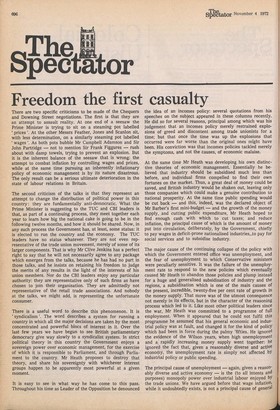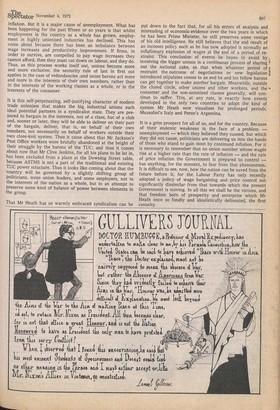Freedom the first casualty
There are two specific criticisms to be made of the Chequers and Downing Street negotiations. The first is that they are an attempt to assault reality. At one end of a seesaw the Prime Minister is trying to sit on a steaming pot labelled ' prices '. At the other Messrs Feather, Jones and Scanlon sit, with less determination, on a similarly steaming pot labelled ' wages '. As both pots bubble Mr Campbell Adamson and Sir John Partridge — not to mention Sir Frank Figgures — rush about with damp towels, trying to prevent an explosion. But it is the inherent balance of the seesaw that is wrong: the attempt to combat inflation by controlling wages and prices, while at the same time pursuing an inherently inflationary policy of economic management is by its nature disastrous. The only result can be a serious ultimate deterioration in the state of labour relations in Britain.
The second criticism of the talks is that they represent an attempt to change the distribution of political power in this country : they are fundamentally anti-democratic. What the Prime Minister is suggesting to the TUC and CBI leaders is that, as part of a continuing process, they meet together each year to learn how big the national cake is going to be in the following twelve months, and how it should be shared. Now, in any such process the Government has, at least, some status: it is elected to run the country and the economy. The TUC leaders have no status whatever. They are not even representative of the trade union movement, merely of some of its larger components. That is why Mr Clive Jenkins has a perfect right to say that he will not necessarily agree to any package which emerges from the talks, because he has had no part in those talks, and he insists on retaining his freedom to judge the merits of any results in the light of the interests of his union members. Nor do the CBI leaders enjoy any particular authority: they are representative only of such firms as have chosen to join their organisation. They are admittedly not representative of the retail trade associations. And nobody at the talks, we might add, is representing the unfortunate consumer.
There is a useful word to describe this phenomenon. It is ' syndicalism '. The word describes a system for running a country in which all the major decisions are taken by the most concentrated and powerful blocs of interest in it. Over the last few years we have begun to see British parliamentary democracy give way slowly to a syndicalist system. In strict political theory in this country the Government enjoys a sovereign power over economic management, for the exercise of which it is responsible to Parliament, and through Parliament to the country. Mr Heath proposes to destroy that theory, and share his sovereignty with whichever interest groups happen to be apparently most powerful at a given moment. the idea of an incomes policy: several quotations from his speeches on the subject appeared in these columns recently. He did so for several reasons, principal among which was his judgement that an incomes policy merely restrained explosions of greed and discontent among trade unionists for a time; but that once the time was up the explosions that occurred were far worse than the original ones might have been. His conviction was that incomes policies tackled merely the symptoms, and not the causes, of economic malaise.
At the same time Mr Heath was developing his own distinctive theories of economic management. Essentially he believed that industry should be subsidised much less than before, and individual firms compelled to find their own fortunes on the market. Thus, a great deal of money could be saved, and British industry would be shaken out, leaving only those companies which could make a genuine contribution to national prosperity. At the same time public spending would be cut back — and this, indeed, was the declared object of Mr Barber's first mini-budget — and the growth of the money supply, and cutting public expenditure, Mr Heath hoped to find enough cash with which to cut taxes; and reduce inflation, the principal cause of which is the amount of money put into circulation, deliberately, by the Government, chiefly to pay wages in deficit-prone nationalised industries,.to pay for social services and to subsidise industry.
The major cause of the continuing collapse of the policy with which the Government entered office was unemployment, and the fear of unemployment to which Conservative ministers were peculiarly sensitive. It was the failure of the unemployment rate to respond to the new policies which eventually caused Mr Heath to abandon those policies and plump instead for a huge and generalised subsidisation of industry and the regions, a subsidisation which is one of the main causes of the present, incredible, twenty-five per cent rate of growth in the money supply. That move was of the utmost consequence not merely in its effects, but in the character of the reasoning process which led to it. Like most other political leaders since the war, Mr Heath was committed to a programme of full employment. When it appeared that he could not fulfil this programme he assumed that his general economic and industrial policy was at fault, and changed it for the kind of policY which had been in force during the palmy 'fifties. He ignored the evidence of the Wilson years, when high unemployment and a: rapidly increasing money supply went together: he ignore1 the fact that, given a reasonably diverse and active econo4iy, the unemployment rate is simply not affected bY indust ial policy or public spending.
The principal cause of unemployment — again, given a reasonably diverse and active economy — is the (to all intents and purposes) monopoly power over industrial labour enjoyed bY the trade unions. We have argued before that wage inflation, while it undoubtedly exists, is not a principal cause of general inflation. But it is a major cause of unemployment. What has been happening for the past fifteen or so years is that whilst employment in the country as a whole has grown, employment in highly unionised industries has declined. This has come about because there has been an imbalance between wage increases and productivity improvement. If firms, in order to survive, are compelled to pay wage increases they cannot afford, then they must cut down on labour, and they do. Thus, as this process works itself out, unions become more and more exclusive; the seniority rule of last in first out applies in the case of redundancies ;and union barons act more and more in the interests of their own members, rather than in the interests of the working classes as a whole, or in the interests of the consumer.
It is this self-perpetuating, self-justifying character of modern trade unionism that makes the big industrial unions such ideal potential partners in a syndicalist state. They are prepared to bargain in the interests, not of a class, but of a club and, sooner or later, they will be able to deliver on their part of the bargain, deliver, that is, on behalf of their own members, not necessarily on behalf of workers outside their own close-knit system. Thus it came about that Mr Jackson's Post Office workers were brutally abandoned at the height of their struggle by the barons of the TUC; and thus it comes about now that Mr Clive Jenkins, for all his plans to be let in, has been excluded from a place at the Downing Street table, because ASTMS is not a part of the traditional and existing TUC power structure. Thus it looks like coming about that the country will be governed by a slightly shifting group of politicians, some union leaders, and some employers, not in the interests of the nation as a whole, but in an attempt to Preserve some kind of balance of power between elements in the group. put down to the fact that, for all his errors of analysis and misreading of economicevidence over the two years in which he has been Prime Minister, he still preserves some vestige of his old intelligence. He still believes that the end result of an incomes policy such as he has now adopted is normally an inflationary explosion of wages at the end of a period of restraint. This conclusion of events he hopes to avoid by , involving the bigger unions in a continuous process of sharing out the national cake, so that when whatever period of s restraint the outcome of negotiations or new legislation : introduced stipulates comes to an end he and his fellow barons can get together to make another bargain. Meanwhile, outside the closed circle, other unions and other workers, and the e consumer and the non-unionised classes generally, will continue to suffer. This, at any rate, is exactly how events • developed in the only two countries to adopt the kind of system Mr Heath now visualises for prolonged periods, Mussolini's Italy and Peron's Argentina.
It is a grim prospect for all of us, and for the country. Because of their endemic weakness in the face of a problem — unemployment — which they believed they caused, but which they did not cause, politicians are delivering us into the hands of those who stand to gain most by continued inflation. For it is necessary to remember that no union member whose wages rise at a higher rate than the rate of inflation — and the rate of price inflation the Government is prepared to control — has anything, for the moment, to fear from that phenomenon. It is difficult to see, now, how the nation can be saved from the future before it, for the Labour Party has only recently adopted a policy of wage bargaining and price control not significantly dissimilar from that towards which the present Government is moving. In all this we shall be the victims, and that freedom born of prosperity and enterprise which Mr Heath once so fondly and idealistically delineated, the first casualty.









































 Previous page
Previous page